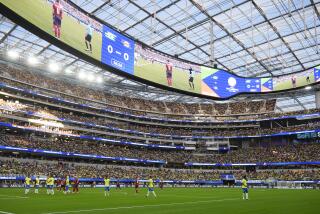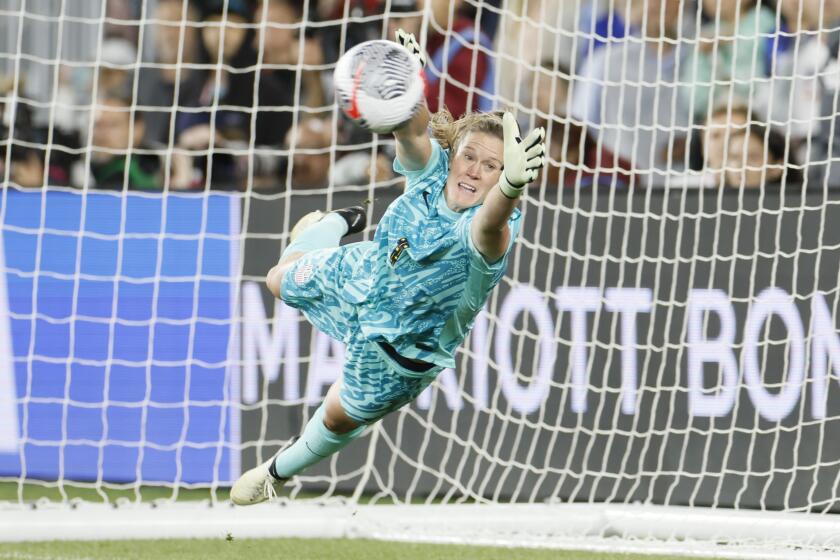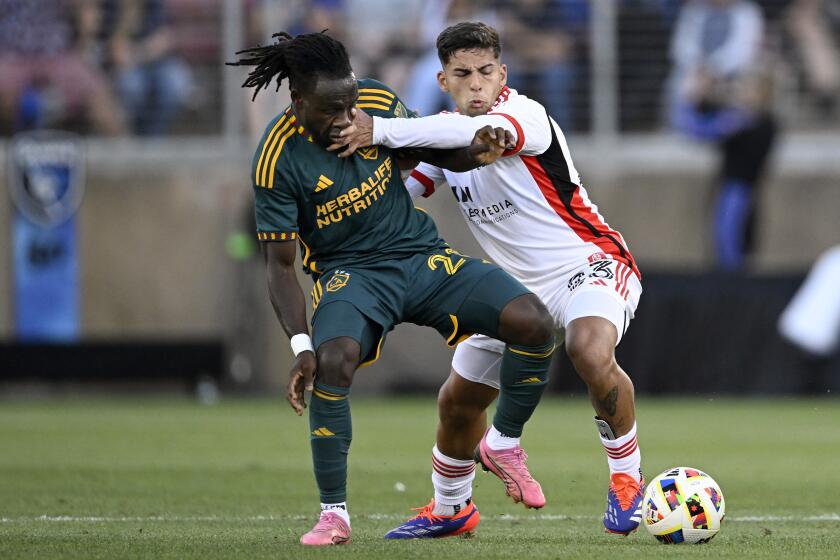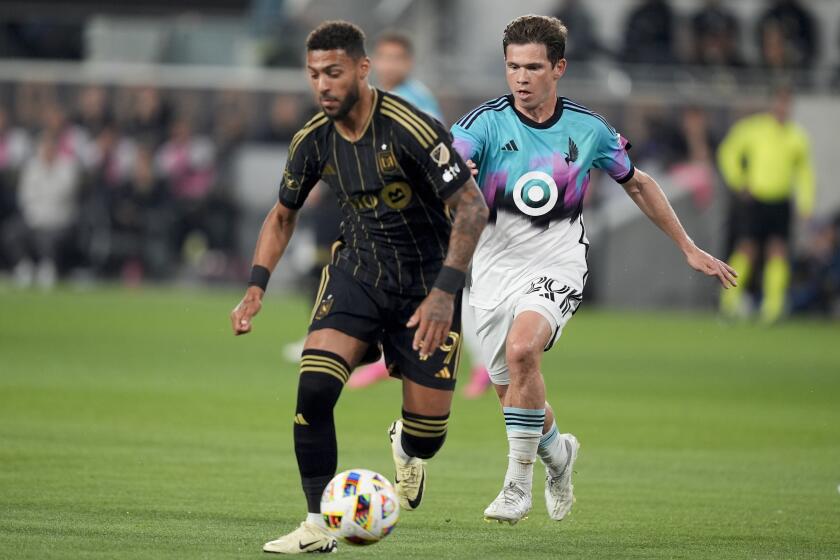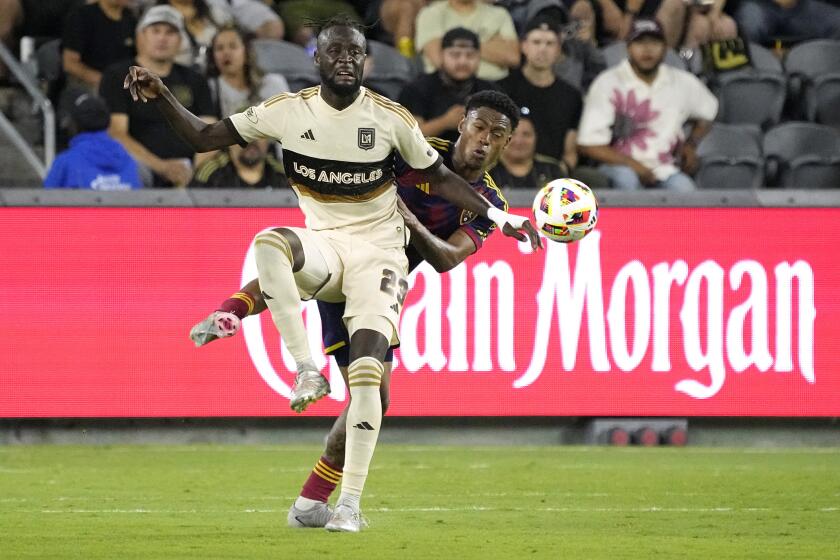SOCCER / GRAHAME L. JONES : Meetings Show Action Isn’t Only on the Pitch
What really happened at the FIFA meetings in New York last week?
On the surface, all seemed to go smoothly, and the leaders of international soccer’s governing body said as much at their closing news conference.
“There was no rivalry between the confederations,” said FIFA President Joao Havelange. “There was a discussion (on allocating World Cup ’98 places) and a final decision was reached. It was unanimously adopted, so there was no rivalry.”
With 14 television cameras rolling and dozens of reporters crammed into an inadequate room, Joseph (Sepp) Blatter, FIFA’s general secretary, echoed Havelange’s words.
“There was a general consensus on the division of teams,” Blatter said. “There was no rivalry. There was no fighting. It was a general consensus, therefore it was done in a fair manner.”
Nonsense.
It was all a lie. A cover-up. A deliberate attempt to pull the wool over the eyes of a press that all too many in FIFA’s hierarchy continue to view as either ignorant, indifferent or malleable.
What really happened during the three days of meetings was a series of furious arguments followed by a blatant instance of abuse of power by Havelange, the 78-year-old Brazilian who has ruled FIFA in an increasingly autocratic manner since 1974.
How intense were the arguments?
“It was not cordial,” said Trinidad & Tobago’s Jack Warner, the president of CONCACAF. “It was very combative, very adversarial.
“We cannot continue with this guerrilla warfare for every World Cup. There has to be a principle established that will stop this. We must try to be objective and become football officials, not football politicians.”
Warner, who has led CONCACAF, the North and Central American and Caribbean region, since 1990, should know better than that.
With the tens of millions of dollars that are at stake in international soccer these days, and the perks that come with power, politics is what it is all about.
Warner is slowly admitting as much.
“For sure, these guys have made deals behind backs,” he said. “They have made deals for the 1998 (FIFA) elections. They have made deals for all kinds of things. There’s no question, (but) I have no idea of who made what deals or what promises have been given.”
One day after voicing those remarks, Warner found out.
In an astonishingly brazen move during the FIFA Executive Committee meeting, Havelange first postponed the second item on the agenda, the decision on appointments to FIFA’s key committees. Then, at the end of the meeting, he produced a printed list, announced that these were the appointments and summarily ended the meeting.
No one had seen the list before. There was no discussion. There was no vote.
What committee members found after examining the list was that Havelange had removed his “hidden enemies,” real or imagined, from all committees.
Among those tossed out were the general secretaries of the European, African, Asian and CONCACAF regions--Gerhard Aigner of Switzerland, Mustapha Fahmi of Egypt, Peter Velappan of Malaysia and Chuck Blazer of the United States.
Also removed was Paolo Casarin of Italy, one of the world’s top refereeing experts.
The Italian daily Gazetta Dello Sport was outraged. In Saturday’s edition, under the headline “Night of the Long Knives at FIFA,” writer Sergio Di Cesare expressed this opinion:
Havelange’s actions, he wrote, represent “a sweeping purge like nothing that has ever happened before in the history of world sport.
“Forget the Stalinist purges, football seems to have returned to the times if the Inquisition, with Joao Havelange in the role of Torquemada.”
Strong words, but typical of the anger many in international soccer harbor toward Havelange, who managed to win reelection at the FIFA Congress in Chicago last June only after promising to increase the World Cup field from 24 teams to 32, giving more places to Africa and Asia.
Havelange apparently feels free to remove from power those he suspects were behind the move to oust him, as well as others who have earned his displeasure.
Worse yet, Havelange already is working to see that another Brazilian, Ricardo Terra Teixeira, inherits his position as FIFA president.
Teixeira is Havelange’s son-in-law.
Last week, Havelange appointed him vice-chairman of the FIFA Referees Committee and a member of the 1998 World Cup Organizing Committee. Both are key positions.
It was Teixeira, president of the Brazilian federation, who Pele last year accused of corruption, a stance that caused Havelange to ban Pele from taking part in the World Cup ’94 Draw in Las Vegas.
Havelange has said he will not run for reelection when his term ends in 1998. Last week he recommended that the FIFA Congress appoint an interim president from the Executive Committee to serve a two-year term.
That way, Havelange argued, the election of future FIFA presidents would not fall in World Cup years.
It is to remove the politics from the sport, he said.
Right.
It just so happens that Teixeira is on the Executive Committee and therefore eligible to be chosen for the interim presidency.
A 47-year-old who describes himself as an economist and stockbroker, Teixeira was elevated to the Executive Committee in Chicago in June.
Havelange continues to position his son-in-law. Moving people like chess pieces is one of his strong suits.
Teixeira was trotted out before the television cameras in New York last week--ostensibly to receive the FIFA Fair Play Award and the Most Entertaining Team Award on behalf of the 1994 Brazilian World Cup team. Each award carried a $100,000 prize.
But everyone present knew Teixeira was merely being put on stage for the benefit of the “gullible” media.
It was Havelange pulling the strings again.
The next few years should prove a fascinating exercise in sporting politics as Havelange continues to promote his protege, while Europe’s soccer leaders seek a way to block Teixeira from assuming the mantle.
And Havelange might have another vote on his side. One of his appointments to the FIFA World Cup Organizing Committee was Alan Rothenberg.

